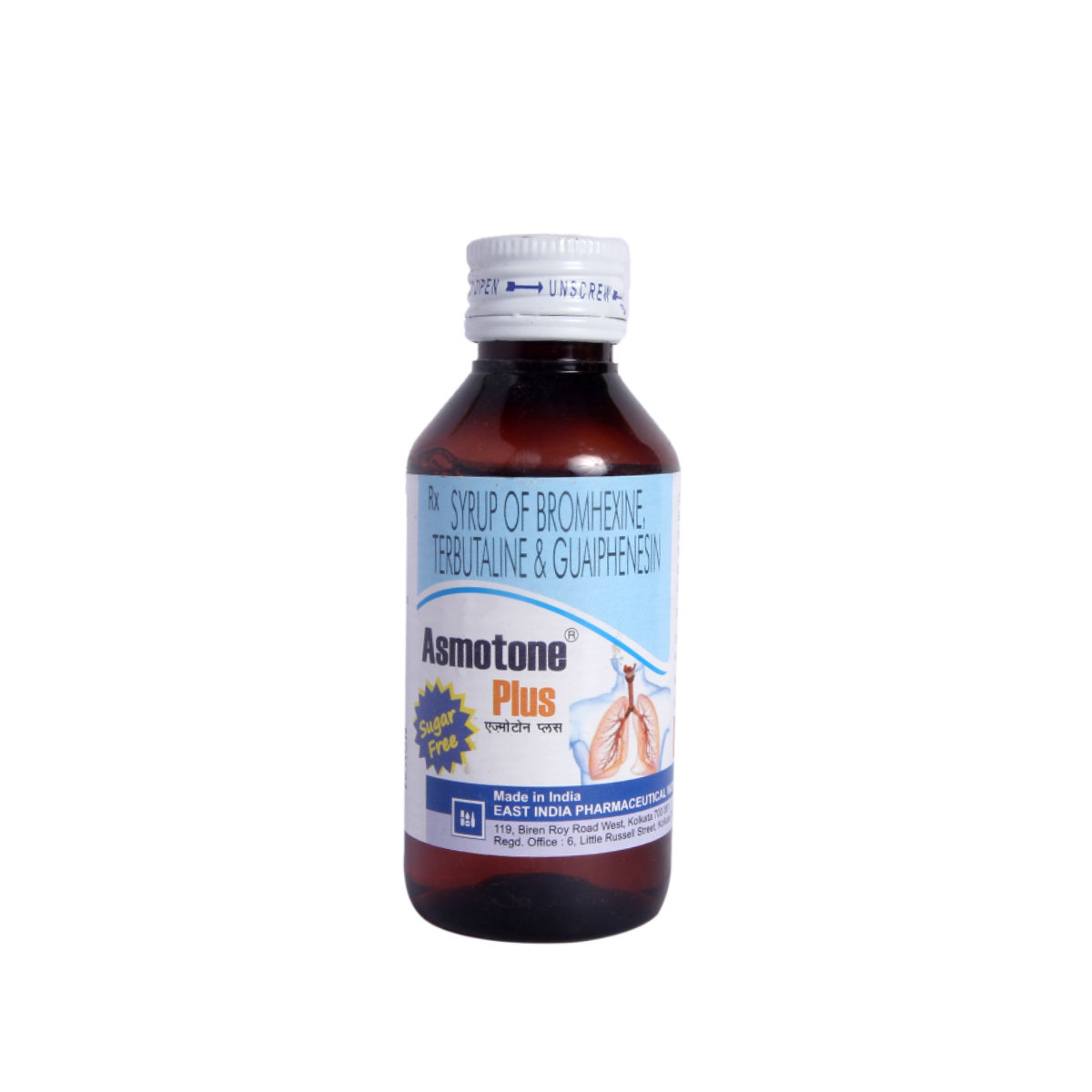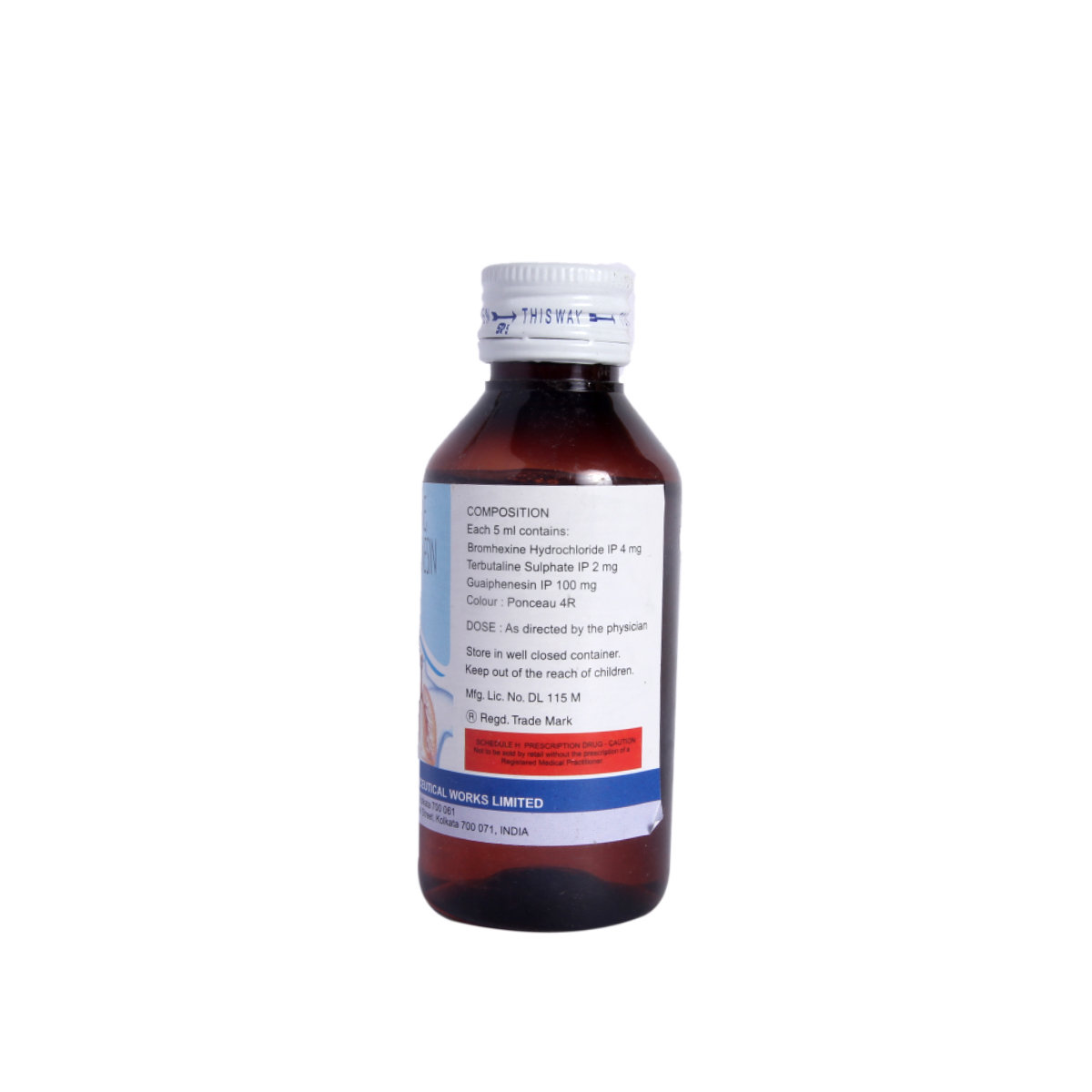Asmotone Plus Syrup 100 ml
MRP ₹95.5
(Inclusive of all Taxes)
₹14.3 Cashback (15%)
Provide Delivery Location
Online payment accepted
 Prescription drug
Prescription drugWhats That
Composition :
Manufacturer/Marketer :
Consume Type :
Expires on or after :
Return Policy :
About Asmotone Plus Syrup
Asmotone Plus Syrup belongs to the class of medicine called 'expectorant' primarily used to treat cough associated with mucus. Coughing (dry or productive) is the body’s way of clearing irritants (like allergens, mucus or smoke) from airways, thereby preventing respiratory infection. Cough is two types, dry cough and chesty cough. A dry cough means it's tickly and doesn't produce any vicious or thick mucus, while a chesty cough means mucous or sputum is produced to help clear your airways.
Asmotone Plus Syrup is a combination of three drugs, namely Guaifenesin (expectorant), Terbutaline (bronchodilator) and Bromhexine (mucolytic agent or cough thinner). Guaifenesin belongs to the class of expectorants that works by increasing the volume of fluid in the airways, reducing the stickiness of mucus and helping to remove it from the airways. Terbutaline belongs to the class of bronchodilators that relaxes muscles and widens the airways. Thereby, it makes breathing easier. Bromhexine belongs to the class of mucolytic agents (cough/sputum thinner) that works by thinning and loosening phlegm (mucus) in lungs, windpipe and nose. Thus, it helps cough out easily.
Use Asmotone Plus Syrup as prescribed by your doctor. Some people may experience nausea, vomiting, drowsiness, headache, dizziness, skin rash, tremor, stomach upset and fast heartbeats. Most of these side effects of Asmotone Plus Syrup do not require medical attention and gradually resolve over time. However, if the side effects persist or worsen, please consult your doctor.
Please tell your doctor if you are allergic to Asmotone Plus Syrup or any other medicines. If you are pregnant or breastfeeding, it is advised to inform your doctor before using Asmotone Plus Syrup . If you have a history of fits or are suffering from fits, please inform your doctor before taking Asmotone Plus Syrup as it may increase the risk of recurrent fits. If you have diabetes, regular monitoring of blood sugar levels is recommended while taking Asmotone Plus Syrup . If you have diabetes, fits, high blood pressure, overactive thyroid, stomach ulcers, phenylketonuria (a congenital disability that causes accumulation of amino acid, phenylalanine in the body), kidney, liver or heart problems, please inform your doctor before taking Asmotone Plus Syrup .
Uses of Asmotone Plus Syrup
Directions for Use
Key Benefits
Asmotone Plus Syrup is a combination of three drugs, namely Guaifenesin, Terbutaline and Bromhexine, used to treat a cough with mucus. Guaifenesin belongs to the class of expectorants that works by increasing the volume of fluid in the airways, reducing the stickiness of mucus and helping to remove it from the airways. Terbutaline belongs to the class of bronchodilators that relaxes muscles and widens the airways. Thus, it makes breathing easier. Bromhexine belongs to the class of mucolytic agents (cough/sputum thinner) that works by thinning and loosening phlegm (mucus) in lungs, windpipe and nose. Thus, it helps cough out easily.
Storage
Drug Warnings
If you are known to be allergic to Asmotone Plus Syrup or any other medicines, please tell your doctor. If you are pregnant or breastfeeding, it is advised to inform your doctor before using Asmotone Plus Syrup . If you are suffering from fits (epilepsy) or have a history of fits, please inform your doctor before taking Asmotone Plus Syrup as it may increase the risk of recurrent fits. If you have diabetes, regular monitoring of blood sugar levels is recommended while taking Asmotone Plus Syrup . If you have diabetes, high blood pressure, overactive thyroid (hyperthyroidism), stomach ulcers/bleeding, phenylketonuria (a congenital disability with high protein in the body), kidney, liver or heart problems, please inform your doctor before taking Asmotone Plus Syrup .
Diet & Lifestyle Advise
- Avoid dairy products such as milk, as it may increase mucus production. Also, avoid processed or refined foods to have relief from cough. Instead, replace baked foods, fried foods, white bread, white pasta, French fries, sugary desserts and chips with green leafy vegetables.
- Drink plenty of fluids to avoid dry throat while you have a cough and loosen mucus.
- Avoid citrus fruits as they may worsen the cough. Eat fruits rich in water content, such as pears, watermelon, peaches and pineapples.
Side Effects of Asmotone Plus Syrup
- Nausea
- Vomiting
- Drowsiness
- Headache
- Dizziness
- Skin rash
- Tremor
- Stomach upset
- Fast heartbeats
Habit Forming
Therapeutic Class
All Substitutes & Brand Comparisons
Author Details
We provide you with authentic, trustworthy and relevant information
FAQs
Drug-Drug Interactions Checker List
- PROPRANOLOL
- EPINEPHRINE
- FUROSEMIDE
- PROMETHAZINE
- OXYTOCIN
- FORMOTEROL
- ONDANSETRON
- DYPHYLLINE
Special Advise
Regular monitoring of blood sugar levels is recommended while taking Asmotone Plus Syrup if you have diabetes.
Disease/Condition Glossary
Cough: Coughing is the body’s way of clearing irritants (like allergens, mucus or smoke) from airways and preventing infection. Coughs may be dry or productive. A productive cough (wet cough) brings up sputum (phlegm, mucus and other matter) from the lungs. Cough is commonly caused as a response to allergy or viral infection but coughing up mucus is possibly an indication of disease in the respiratory tract. If you are coughing thick, solid white mucus, it indicates you may have a bacterial infection in the airways. If the mucus is clear or light-coloured, it means you may have allergies or minor illness in the respiratory tract, and yellow or green mucus indicates a respiratory infection.

Have a query?
Alcohol
Safe if prescribed
The interaction of alcohol with Asmotone Plus Syrup is unknown. Please consult a doctor before consuming alcohol with Asmotone Plus Syrup .
Pregnancy
Consult your doctor
The safety of Asmotone Plus Syrup in pregnant women is unknown. Therefore, it is given to pregnant women only if the doctor thinks the benefits outweigh the risks.
Breast Feeding
Consult your doctor
It is unknown whether Asmotone Plus Syrup is excreted in human milk. Asmotone Plus Syrup is given to breastfeeding mothers only if the doctor thinks the benefits are greater than the risks.
Driving
Safe if prescribed
Asmotone Plus Syrup may cause dizziness or drowsiness in some people. Therefore, drive only if you are alert after taking Asmotone Plus Syrup .
Liver
Consult your doctor
Take Asmotone Plus Syrup with caution, especially if you have a history of Liver diseases/conditions. The dose may be adjusted by your doctor as required.
Kidney
Consult your doctor
Take Asmotone Plus Syrup with caution, especially if you have a history of Kidney diseases/conditions. The dose may be adjusted by your doctor as required.
Children
Safe if prescribed
Asmotone Plus Syrup should be used with caution in children and only in doses as prescribed by a doctor.











